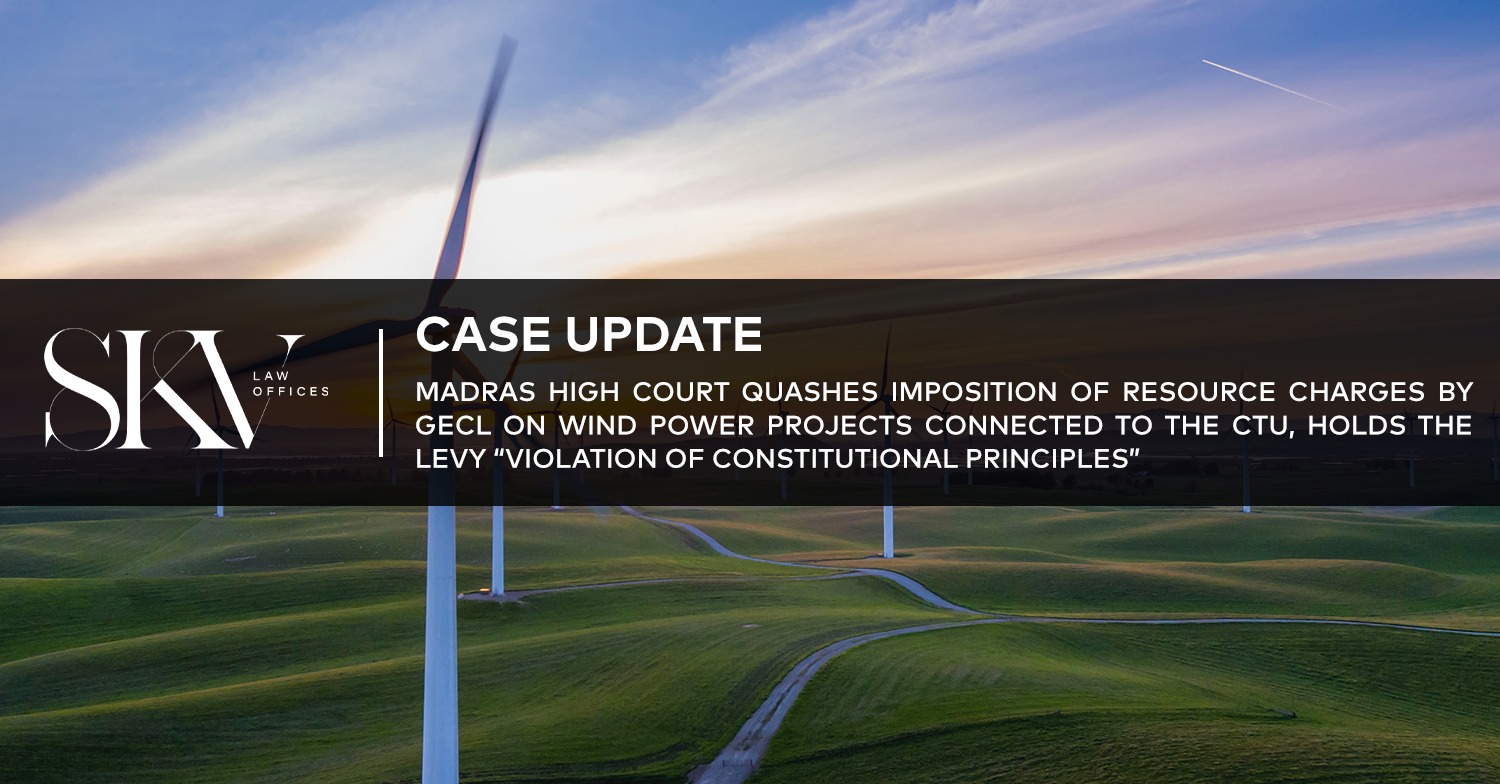Madras High Court Quashes imposition of Resource Charges by GECL on Wind Power Projects connected to the CTU, holds the levy “violation of constitutional principles”
18.12.2024
The Madras High Court has quashed the imposition of Resource Charges of ₹50 Lakh/MW on Central Transmission Utility (“CTU”)-connected wind power projects in Tamil Nadu, holding that the levy was made despite complete lack of jurisdiction and in violation of constitutional principles. The order was passed by the Hon’ble High court in a petition filed by SKV Law offices on behalf of T.P Vardhaman Surya Ltd. along with several other independent wind power producers (“Petitioners”) to challenge an order passed by the board of Tamil Nadu Green Energy Corporation Limited (“GECL”) on 06.08.2024 (“Impugned Order”). This order by GECL sought to arbitrarily collect Resource Charges of ₹50 Lakh/MW from the CTU-connected wind power producers.
The Impugned order amended the procedure originally issued in 2018 by Tamil Nadu Generation and Distribution Corporation Limited (“TANGEDCO”), the entity that controlled renewable energy assets currently owned by GECL before the Tamil Nadu Restructuring and Transfer Scheme, 2024 was passed by the Government of Tamil Nadu. Under the 2018 framework, no such Resource Charges were levied on wind projects, and the approval charges imposed (at that time) were procedural, distinct and comparatively nominal.
The Petitioners contended that such charges were beyond the powers of GECL in view of provisions of Electricity Act, 2003 as well as the Constitutional provisions. It was principally contended that GECL or the State Government could not impose restrictions selectively on inter-state generation and supply of electricity which was within the domain of Central Electricity Regulatory Commission (“CERC/Central Government”). Further, it was contended that GECL disproportionately targeted CTU-connected wind projects while leaving State Transmission Utility (“STU”)-connected projects unaffected, thereby amounted to discrimination and creation of an unequal playing field.
Further, the Petitioners emphasized that the Electricity Act, 2003, clearly delineates electricity generation as a delicensed activity, and any levy resembling a tax or cess would be impermissible without specific legislative sanction.
The respondents argued that the levy was necessitated to meet the Renewable Purchase Obligation (RPO) imposed by the Central Government through a Gazette Notification dated October 20, 2023. Under this mandate, non-compliance with RPO targets would result in substantial penalties for the state. The same could potentially burden the consumers with higher tariffs in future. The Respondents asserted that imposing Resource Charges on CTU-connected projects was a means to offset the financial liability arising from penalties and ensure equitable utilization of wind energy resources of the State within Tamil Nadu.
The Court finding credence in the submissions made by the Petitioners ruled that the GECL lacked the requisite authority to unilaterally impose Resource Charges. Additionally, the Court held that the levy contravened Article 14 of the Constitution by creating an unjustified distinction between CTU-connected and STU-connected projects, both of which rely on the same resource for power generation I.e., wind.
The Court, while acknowledging the State’s concerns regarding RPO compliance, held that the imposition of charges on private developers under the guise of “resource utilization” lacked any legal sanctity. It observed that while the State could regulate the utilization of renewable resources to serve broader public interests, such regulation must be grounded in statutory authority and executed in a non-discriminatory manner. The imposition of Resource Charges, in its current form i.e., the Impugned Order, was deemed arbitrary, retrospective, and violative of constitutional principles under Article 19(1)(g) – which grants every citizen a fundamental right to practice any trade, occupation or profession along with Article 301, which grants the freedom of inter-state trade. The court also held that the levy of these resource charges also violates Article 265 of the Constitution, which clearly states that no tax can be levied without the authority of law.
The High Court was thus pleased to set aside the Impugned Order arbitrarily levying Resource Charges, underscoring that any such imposition must be backed by statutory authority and applied uniformly. While the Court recognized the State’s obligation to meet its RPO targets, it emphasized that financial burdens cannot be arbitrarily shifted onto private players without due process and legal sanction. Lastly, however, the Madras High Court held that GECL was entitled to impose condition for providing of electricity to STU by wind energy generators like the Petitioner commensurate with their generating capacity to fulfil the RPO obligation of the State, which has been fixed by MOP vide Notification dated 20.10.2023.
P. Vardhaman Surya was represented before the Madras High Court by Senior Advocate Mr. C.S. Vaidyanathan, instructed and assisted by Mr. Shri Venkatesh, Managing Partner; Mr. Ashutosh Srivastava, Counsel; Mr. Bharath Gangadharan, Counsel; Mr. Siddharth Nigotia, Senior Associate and Mr. Kshitij Pandey, Trainee Associate of SKV Law Offices Team along with the Advocate on Record Adv. Abhinav Parthasarathy.


